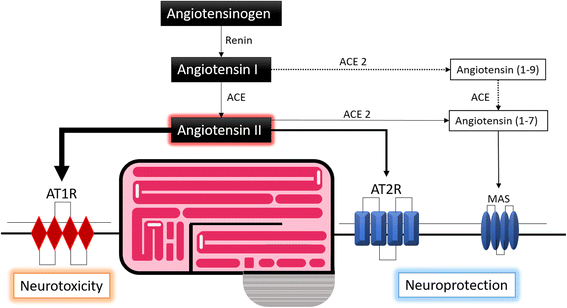The renin-angiotensin system: a possible new target for depression
- PMID: 28760142
- PMCID: PMC5537940
- DOI: 10.1186/s12916-017-0916-3
The renin-angiotensin system: a possible new target for depression
Abstract
Depression remains a debilitating condition with an uncertain aetiology. Recently, attention has been given to the renin-angiotensin system. In the central nervous system, angiotensin II may be important in multiple pathways related to neurodevelopment and regulation of the stress response. Studies of drugs targeting the renin-angiotensin system have yielded promising results. Here, we review the potential beneficial effects of angiotensin blockers in depression and their mechanisms of action. Drugs blocking the angiotensin system have efficacy in several animal models of depression. While no randomised clinical trials were found, case reports and observational studies showed that angiotensin-converting enzyme inhibitors or angiotensin receptor blockers had positive effects on depression, whereas other antihypertensive agents did not. Drugs targeting the renin-angiotensin system act on inflammatory pathways implicated in depression. Both preclinical and clinical data suggest that these drugs possess antidepressant properties. In light of these results, angiotensin system-blocking agents offer new horizons in mood disorder treatment.
Keywords: ATR1; ATR2; Angiotensin; Angiotensin receptor blockers; Angiotensin-converting enzyme inhibitors; Depression; Inflammation; Mas; Psychiatry; Renin–angiotensin system.
Conflict of interest statement
Ethics approval and consent to participate
Not applicable.
Consent for publication
Not applicable.
Competing interests
The authors declare that they have no competing interests.
Figures


References
-
- Gard PR. The brain renin-angiotensin system: a target for novel antidepressants and anxiolytics. Drug Dev Res. 2005;65:270–277. doi: 10.1002/ddr.20028. - DOI
Publication types
MeSH terms
Substances
LinkOut - more resources
Full Text Sources
Other Literature Sources
Medical

